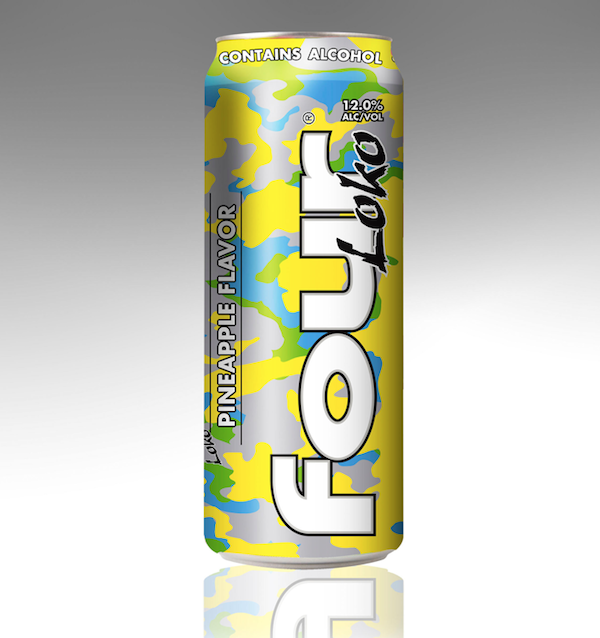Four Loko To Release New Flavor In March


Four Loko lovers will get to try a new flavor next month. Phusion Projects, LLC, the maker of the controversial beverage, announced it will debut the latest flavor—Pineapple—in March, continuing Four Loko’s trend of offering cocktail-flavored malt beverages. It will be the second new flavor introduced in 2013, following a margarita flavor that launched in January.
“Four Loko Pineapple has a vibrant tropical taste that balances the flavors of sweet and tart,” Chris Hunter, one of the co-founders of Phusion Projects, said in a press release. “Adding this flavor to our lineup continues Phusion Projects’ mission to bring flavors to consumers that they desire. It’s important to us as a company to listen to what our consumers want.“
Available in 23.5-ounce cans, the Four Loko pineapple beverage will feature a 12-percent alcohol content, as do other products in the beverage line. The high alcohol content has been a matter of contention with the Federal Trade Commission and the Food and Drug Administration, however.
Just last week, Phusion Projects agreed to change the product’s label in order to settle government charges of deceptive marketing.
The FTC announced the company will be required to put an “alcohol facts panel” on the back of any of its cans containing more than two servings of alcohol. The panel, which will resemble “nutritional facts” labels on foods, will disclose the alcohol by volume and the number of servings in each container. Phusion will also be required to redesign its packaging for any drinks containing more than 2.5 servings of alcohol so they can be resealed and not be consumed in one sitting. For some time the FTC has accused Phusion of advertising its 23.5-ounce cans of Four Loko contain the equivalent of one or two 12-ounce cans of beer when—because of their 12-percent alcohol content—they are actually more like four to five beers. Although Phusion is complying with the FTC’s direction, company co-founder Jaisen Freeman does not agree with the allegations.
“We share a common interest with the FTC in providing consumers with information and packaging options to help them make informed, responsible decisions,” Freeman said. “As a responsible alcohol beverage company, resolving the issues raised by the FTC through this agreement demonstrates Phusion’s continued commitment to being an industry leader and solid corporate citizen, not just in sales, but also in transparency, cooperation and responsibility.”
Hunter, Freeman and Jeff Wright, three Kappa Sigma brothers from Ohio State University, created the idea for Four Loko back in 2005 when they noticed how many students were mixing alcohol and caffeine at bars. The three formed Phusion LLC and began selling 23-ounce cans of Four Loko—the “Four” coming from the beverage’s primary ingredients of alcohol, caffeine, taurine and guarana—at stores around campus. Soon the fruit-flavored beverage took off, and by 2008 could be purchased in 46 states and Europe. Four Loko reached its peak in 2010 when it was featured in rap songs by Kilah Kid Kirz and Ricosuave.
Then, in the fall of 2010, reports of Four-Loko related hospitalizations began hitting the news. When 23 were hospitalized after a Four Loko binge at New Jersey’s Ramapo College, the school banned the drink. Soon after, nine students at Central Washington University were hospitalized after mixing large amounts of Four Loko with other alcohols. By November, a growing list of colleges and universities had followed Ramapo’s lead and banned the sale of Four Loko. Multiple deaths related to the beverage were reported across the United States, and grocery chains such as Wegman’s pull the drink from their shelves. States such as Washington, Michigan, Utah and Oklahoma ban the beverage. In November 2010, the FDA effectively banned all caffeinated alcoholic beverages. Dec. 10, 2010, was the last day Four Loko could be legally purchased in New York, as it was banned along with party drug K-2.
In response to the controversy—and in order to continue marketing its product—Phusion changed its recipe at the end of 2010, removing caffeine, guarana and taurine. But according to some experts, the altered formula makes no difference.
Why? Sure the drink—in its original formula—had high alcohol content and a boost of caffeine. But since when have college students not binged on booze? And mixing liquor with energy drinks is nothing new. According to psychological scientist Shepard Siegel of McMaster University, the culprit isn’t necessarily the caffeine in the Four Loko and similar beverages, but the fruit flavors—and their effect on alcohol tolerance.
Because Four Loko doesn’t taste like beer and other malt beverages, Siegel wrote in the journal Perspectives on Psychological Science, it doesn’t provide the psychological cues that prepare a person for the consequences of alcohol intake.
“Four Loko didn’t have the extraordinary intoxicating effect because of caffeine, but rather because of the phenomenon of situational specificity of tolerance”, wrote Siegel.
According to Siegel, if someone continually consumes a particular flavor mixed with alcohol, he or she would eventually form a strong association between that flavor and the effects of alcohol, leading to a higher tolerance, and the beverage would be less intoxicating.
“Four Loko’s fruit flavor hasn’t been previously paired with alcohol, and because that association between flavor and alcohol hasn’t been made, greater intoxication may occur,” Siegel wrote.
Since mid-2011, Phusion has released new flavors every few months. If Siegel’s theory is correct, new flavors such as pineapple and margarita are only exacerbating Four Loko’s intoxicating effects. Only time will tell if the new label makes a difference.
[Image via Four Loko]































